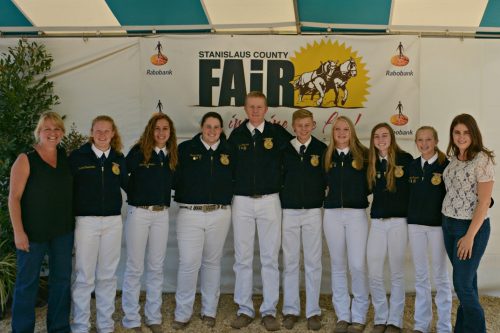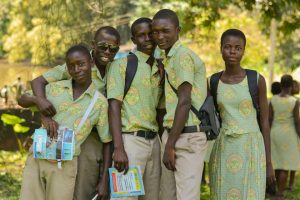 It has been three years since my team of AgriCorps Fellows set out for our training in Texas – a whirlwind of adventure ensued over the following year and has kept me swept up in travels since first being recruited to AgriCorps in the spring of 2014. After completing my year of service in Ghana and moving back to the US, I repacked all my things and, 3 weeks after returning from West Africa, drove west from Pennsylvania to my current home in Central Valley California. I am about to enter my third year as the Agriscience Instructor and FFA Advisor at Ripon Christian High School. This position was a door opened while many other seemed to be closing when I was job searching in the spring of 2015. And since establishing the agriculture program in the fall of 2015, I have been blessed with a wonderful school and community to work in as we continue to grow the agricultural education program.
It has been three years since my team of AgriCorps Fellows set out for our training in Texas – a whirlwind of adventure ensued over the following year and has kept me swept up in travels since first being recruited to AgriCorps in the spring of 2014. After completing my year of service in Ghana and moving back to the US, I repacked all my things and, 3 weeks after returning from West Africa, drove west from Pennsylvania to my current home in Central Valley California. I am about to enter my third year as the Agriscience Instructor and FFA Advisor at Ripon Christian High School. This position was a door opened while many other seemed to be closing when I was job searching in the spring of 2015. And since establishing the agriculture program in the fall of 2015, I have been blessed with a wonderful school and community to work in as we continue to grow the agricultural education program.
One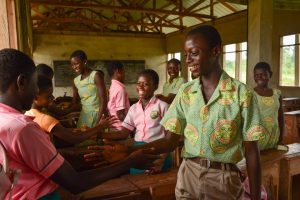 of my favorite aspects of working in Ghana was developing relationships with my students. When it comes to impacting the globe, there is truly no better way to create positive change than by investing in the lives of youth. Seeing and promoting their potential for leadership and service was one of the most rewarding experiences of my time with AgriCorps. It is this passion for youth development – spurred by working with Ghanaian youth – that led me to my current position of ag teacher/FFA advisor here in California. At the time of searching for the next step after AgriCorps, I was not planning to enter the profession of secondary agricultural education in the US. However, as I reflected on the joy of working with youth in and out of the classroom – both from my FFA days and time with my Ghanaian students – I realized that I could combine that joy with my experiences to create positive change through agricultural education in a local US community.
of my favorite aspects of working in Ghana was developing relationships with my students. When it comes to impacting the globe, there is truly no better way to create positive change than by investing in the lives of youth. Seeing and promoting their potential for leadership and service was one of the most rewarding experiences of my time with AgriCorps. It is this passion for youth development – spurred by working with Ghanaian youth – that led me to my current position of ag teacher/FFA advisor here in California. At the time of searching for the next step after AgriCorps, I was not planning to enter the profession of secondary agricultural education in the US. However, as I reflected on the joy of working with youth in and out of the classroom – both from my FFA days and time with my Ghanaian students – I realized that I could combine that joy with my experiences to create positive change through agricultural education in a local US community.
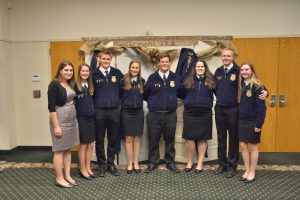 Thus far, it has been extremely rewarding to see how my students, novices to the opportunities in agriculture and leadership development when they signed up for their first ag class 2 years ago, have developed a passion for agriculture and servant leadership through the three components of agricultural education. Students have engaged in hands-on activities in and out of the classroom and have been able to experience local agriculture through field trips. SAE projects are active and diverse – ranging from the dedicated livestock show team to placement on local farms or even owning individual agribusinesses. Our FFA chapter comprises about 25% of the high school student body with membership around 50 students. Between public speakers and CDE/LDE team members, over 50% of our membership has been actively involved in FFA competitive events with several placings at the state level this past year – quite an accomplishment in the competitive state of California. Ripon Christian FFA has attended almost all state FFA leadership conferences and events as well as the National FFA convention and is active in the school and community through agricultural literacy and service projects.
Thus far, it has been extremely rewarding to see how my students, novices to the opportunities in agriculture and leadership development when they signed up for their first ag class 2 years ago, have developed a passion for agriculture and servant leadership through the three components of agricultural education. Students have engaged in hands-on activities in and out of the classroom and have been able to experience local agriculture through field trips. SAE projects are active and diverse – ranging from the dedicated livestock show team to placement on local farms or even owning individual agribusinesses. Our FFA chapter comprises about 25% of the high school student body with membership around 50 students. Between public speakers and CDE/LDE team members, over 50% of our membership has been actively involved in FFA competitive events with several placings at the state level this past year – quite an accomplishment in the competitive state of California. Ripon Christian FFA has attended almost all state FFA leadership conferences and events as well as the National FFA convention and is active in the school and community through agricultural literacy and service projects.
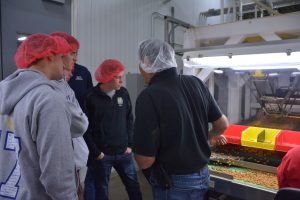 California agriculture is a little different from Ghanaian and Pennsylvanian farming, but I nonetheless continue to see agriculture as a global system of local farmers striving to use technology and advancements to produce food and fuel for a growing world. For example, irrigation technology has allowed this valley to transform a would-be desert to one of the most fertile tracts of land in the world. Almost 100% of the nation’s almonds are grown in a 100 mile radius of my home. Local dairies milk an average of 1000 cows or more. Agriculture may be big here in California, but the communities are still small – just like the farming village of Osiem, Ghana – where I spent my time with AgriCorps.
California agriculture is a little different from Ghanaian and Pennsylvanian farming, but I nonetheless continue to see agriculture as a global system of local farmers striving to use technology and advancements to produce food and fuel for a growing world. For example, irrigation technology has allowed this valley to transform a would-be desert to one of the most fertile tracts of land in the world. Almost 100% of the nation’s almonds are grown in a 100 mile radius of my home. Local dairies milk an average of 1000 cows or more. Agriculture may be big here in California, but the communities are still small – just like the farming village of Osiem, Ghana – where I spent my time with AgriCorps.
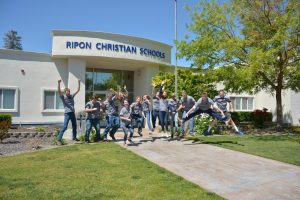 Small towns like Ripon can easily lose sight of global perspective, and many of my students have never been abroad, let alone out of the state. Nonetheless, there are opportunities to develop global competency in youth – even if it is only in the classroom. In addition to wearing my African attire to school regularly and being questioned about Ghana, I attempt to incorporate my global experiences into my curriculum of agronomic production. Case studies allow students to see the diversity of agriculture around the globe and my stories of working with local farmers around the world always intrigue my students. I have shared about my global experiences with my students and am even working with my school to develop an international experience for Ripon Christian agricultural education students in the summer of 2019. From both a Christian and agricultural perspective, I feel it is important for my students to experience and value their global brothers and sisters in the agricultural industry and hopefully spur international interest in some of these future leaders. Although it can be just as difficult to change one’s perspective in a small California town as it is in a rural Ghanaian village, time and investing in relationships proves worthwhile in developing the future leaders of the global agriculture industry: I am honored to have the opportunity to continue with the profession of teaching.
Small towns like Ripon can easily lose sight of global perspective, and many of my students have never been abroad, let alone out of the state. Nonetheless, there are opportunities to develop global competency in youth – even if it is only in the classroom. In addition to wearing my African attire to school regularly and being questioned about Ghana, I attempt to incorporate my global experiences into my curriculum of agronomic production. Case studies allow students to see the diversity of agriculture around the globe and my stories of working with local farmers around the world always intrigue my students. I have shared about my global experiences with my students and am even working with my school to develop an international experience for Ripon Christian agricultural education students in the summer of 2019. From both a Christian and agricultural perspective, I feel it is important for my students to experience and value their global brothers and sisters in the agricultural industry and hopefully spur international interest in some of these future leaders. Although it can be just as difficult to change one’s perspective in a small California town as it is in a rural Ghanaian village, time and investing in relationships proves worthwhile in developing the future leaders of the global agriculture industry: I am honored to have the opportunity to continue with the profession of teaching.
Allison Hoover is an Agricultural Education graduate of Pennsylvania State University. Allison served as an AgriCorps Fellow in 2014-15 and was apart of the inaugural AgriCorps class.


